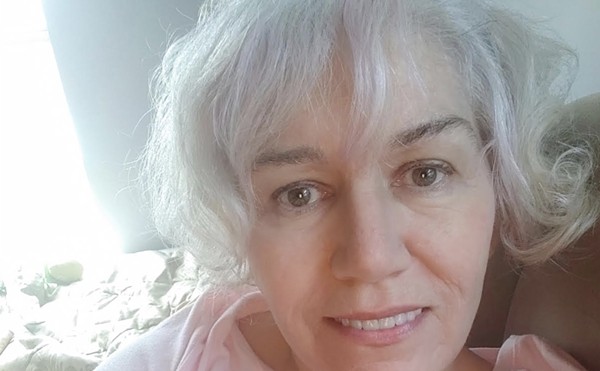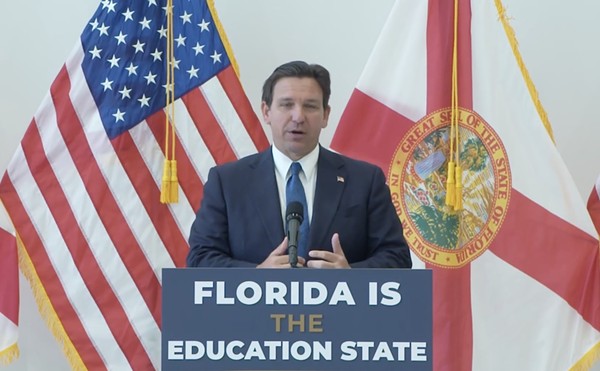Tempers weren't exactly flaring at the city's June 30 neighborhood meeting at the Lake Highland Preparatory School Harriet Coleman Center for the Arts. There were no loud protests or screaming matches. Maybe there should have been.
About 50 people showed up to discuss the planned development of a 16-acre parcel adjacent to the site, a swath of land riddled with arsenic and other contaminants that the city had sold to the prep school in March for $2 million. The city's not making a profit; that money will go toward the site's $13 million environmental cleanup. That the city was all but giving the land away to a school whose parents are among the area's richest and most powerful wasn't the worst of it. In the process, the city may put a string of Lake Ivanhoe businesses in danger of closing.
Outside the meeting, a smattering of well-to-do kids played lacrosse. Inside, city planner Leo Cruz PowerPointed his way through just what the school had in store for its latest acquisition: a softball field, a tree-lined extension of the Dinky Line bike trail, some new signage.
But what was most noticeable was what wasn't there: parking spaces. For the last seven years, nearby Lake Ivanhoe businesses have relied on this lot for free and easy parking for their employees and patrons. After all, the land isn't good for much else. For 70 years, OUC used this as a staging ground for its maintenance site, and in the process dumped a bunch of toxic nastiness into the soil, rendering it essentially unusable.
For the last 10 years or so, the city has tried to figure out what to do with the land — one idea was an "urban village," a la Baldwin Park — but the pollution stood in the way. Finally, the city opted to "sell" the land to the prep school. (When you consider that the $2 million is just one-sixth of the city's total cleanup costs, and the city is giving up all rights to the land anyway, the word "sell" seems generous.)
On Aug. 1 Lake Highland Prep will begin repaving the lot ahead of the next school year. Ultimately, the school will gain more recreational facilities and improved parking, but for nearby merchants, the parking they rely on to survive will evaporate.
"At some point," Laina Shockley, one of the owners of Ethos Vegan Kitchen, stood up and said, "there is no parking, there are no guests, there is no business."
The city's agreement with Lake Highland didn't include any provision for the businesses' parking. Without that lot, all they have is the wholly inadequate storefront street parking spaces along Orange Avenue. The landlocked businesses are now between a lake and a CSX railroad line, and fighting for their lives.
Shockley, who opened Ethos with her husband a year and a half ago, has seen firsthand the woes of parking issues. She employs 18 people — some of whom commute on bicycles, but not when it rains — and knows that the two places to which she is entitled behind her 78-seat restaurant, along with the 15 spots lining the street, are not enough to keep her head above water.
To make matters worse, in the coming months, she stands to lose four of those street parking spots when the state road is repaved. She fears that her business, located in a building constructed in 1925, may be effectively zoned out of existence.
"Instead of us having to be retrofitted into their new code," she says, "I think we need more creative exploration as to how do we preserve this area."
Ivanhoe Village Main Street president Gordon Spears has been pushing to preserve the viability of retail space on North Orange Avenue. He's not a fan of how the Lake Highland Prep deal went down. In his view, the city's decade-long efforts to deal with this property were fraught with bad decisions — "The school knew that the city was over this barrel `and` that the city itself put itself there," he says — and ended up with a deal that would help them bring the lot up to EPA standards and help the private school increase its attractiveness to parents, but do nothing to sustain the struggling business community. The school, says Spears, is willing to lease parking spaces to the businesses, but he thinks that the city should — at least in the long term — come up with a plan that provides free parking for the area. In fact, Shockley says that her restaurant permit was contingent on the free parking in the lot.
Orlando city commissioner Robert Stuart, who represents this area, says the parking issue isn't the city's problem: "You're in a landlocked area and you've had the luxury of free parking. … Their answer is the city should provide parking. My position is I'm not sure if it should."
Stuart says that if SunRail is eventually approved, the sides of the nearby CSX railroad tracks will have to be secured for homeland security purposes, leaving even less room to consider a permanent parking solution. "I think, in time, the problem will be solved," he says. "They've had a wonderful benefit, and now they think it's something they've earned."
Spears argues that the city should reroute its free Lymmo service to the area, thereby mitigating the need for parking spaces. He also suggests that the city build a parking garage on the portion of OUC land that the school did not buy, across Highland Avenue. (The city is building a $32 million parking garage to support the Orlando Magic's new arena, after all.) Presently, that lot is grassed over and littered with debris from a messy demolition of a water treatment plant, thereby making it a liability that Stuart says the city won't take on.
Just before the city's June 30 neighborhood meeting — "at the eleventh hour, literally," says Spears — OUC and the school agreed to temporarily allow the merchants to use the grassed-over lot across the street from the current lot for an as-yet-undetermined amount. (OUC is working out insurance costs.) Meanwhile, the school says that it will allow merchants to pay a higher premium ($35 per month per space) in its new parking lot when it is finished.
That's a temporary solution, Spears says — one that he suspects will last only until the city can make money from selling that property, too.
[email protected]
















